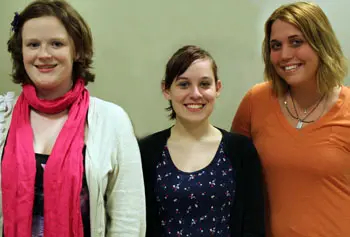Source: UMAssLowell

UML Students Against Human Trafficking hosts its first, public educational seminar to help combat this crime. From left, board members Althea Sellars, Sophie Hansen and Sema Gifford. Missing from photo is Kelsey Lenfest.
It's a widespread crime, yet the victims of modern-day slavery — the illegal trade of humans into prostitution and involuntary servitude — are often invisible, often living undetected in neighborhoods across the United States for many years, or a lifetime.
Through increased awareness, more victims can be identified and rescued, says UMass Lowell Students Against Human Trafficking. The student organization is stepping up efforts to educate students and the community about human trafficking with its first seminar since organizing a year ago. The "Human Trafficking 101" seminar will be held on Thursday, March 29 from 3 to 4:30 p.m., in Coburn Hall, room 205, at 850 Broadway St., South Campus, and is open to the public.
"Our hope is that this event will encourage the attendees to research more about human trafficking and to tell at least five people about this issue," says Sophie Hansen, a criminal justice and psychology senior who took over as president of the student organization in September 2011; it was founded in January 2011 by Christi Fellows, a criminal justice major. "This issue exists and comes in many forms, most of which we cannnot see. We'd like to remind people that it's out there and that people need our help."
Human trafficking has risen sharply in the past decade and now ties the arms trade as the second-largest criminal industry in the world — second only to the drug trade — and is the fastest growing, according to United States Department of Health and Human Services.
Statistics indicate that between 20,000 and 50,000 of trafficking victims work in forced labor and the sex trade in scores of American cities and towns; scholars believe the number is much higher. Most are trafficked into this country from at least 77 countries through "force, fraud or coercion," the characteristics that define this crime and under which it is prosecuted.
Hansen, who took an interest in human trafficking after a child maltreatment course at the University, says, "I got involved because human trafficking is rarely heard of, let alone spoken of, and I wanted to shed light on this topical issue and help these victims."
Dr. Ann Marie Aiesi will speak at the March seminar. Aiesi is an expert in victim outreach, identification and policy and the founder of Human Rights Research and Training Publications, a non-government organization dedicated to sharing knowledge and education regarding human rights, especially in an effort to promote freedom from human trafficking.
Aiesi provides training to and assists federal, state and local authorities, health professionals and faith-based organizations and associations in their various anti-trafficking efforts. As a leading human trafficking policy expert, Aiesi submitted recommendations to the 2011 reauthorization of the Federal Anti-Trafficking Law and to the new Massachusetts human trafficking legislation passed by the House and Senate in November 2011 and went into effect last month.
The landmark law, focuses on protecting child prostitutes, but also includes jail time and fines for those who engage in adult prostitution, has its strengths and weaknesses, says Aiesi. Overall, she says, "It is encouraging because it reveals the state's acknowledgement of the seriousness of the problem and its positive intention to take action." Massachusetts was one of three states that did not have a human trafficking law.
"This is the first speaker that we've invited on behalf of our organization," says Hansen. "We are very pleased to have Dr. Aiesi come to UMass Lowell. It is important for all of us to help to educate ourselves and others about the vital need to stop human trafficking in our communities, cities and country."
Related articles


No comments:
Post a Comment